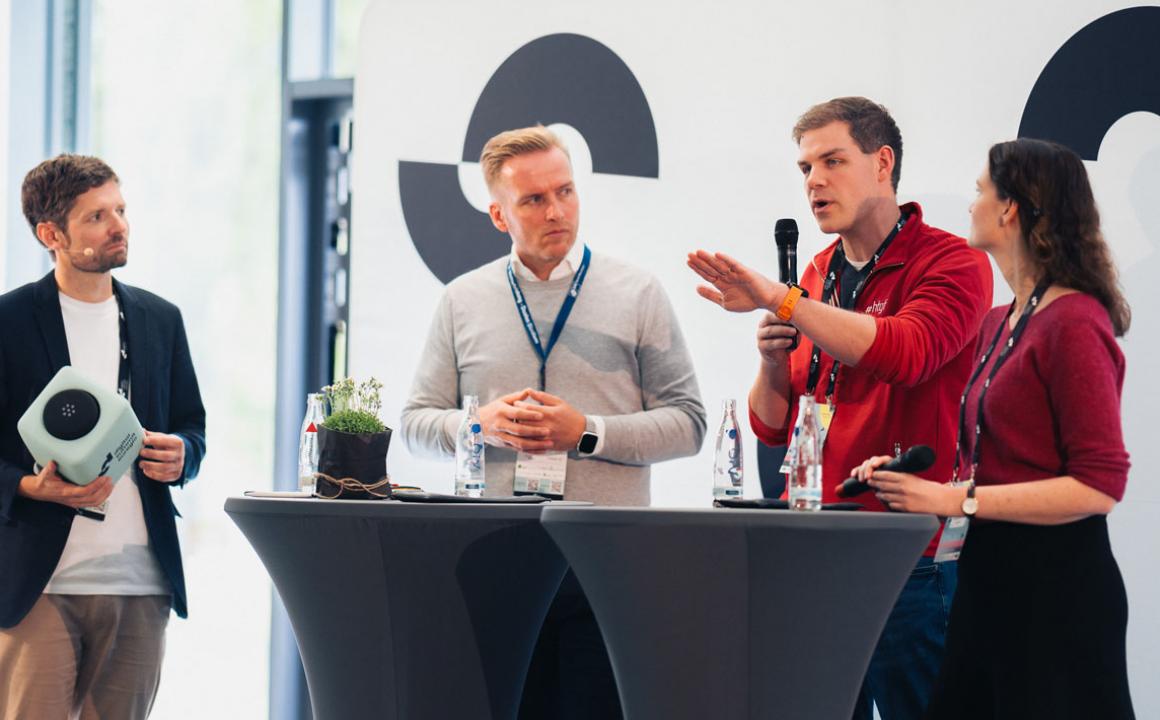The panel was convened to examine the evolving landscape of startup assistance in the context of economic shifts. The panel, moderated by Sebastian Köffer, included Katharina Frie from eCAPITAL, Christian Arndt from High-Tech Gründerfonds, and Mike Verkouter from Novel-T. They examined how recent economic challenges are reshaping startup viability, investment opportunities, and market dynamics.
Cash preservation is king, since funding cycles to get new cash on boards takes longer, especially for deep tech companies.
Katharina Frie, e-capital
Katharina Frie opened the discussion with insights on the necessity of cash preservation for startups during these turbulent times, particularly for deep tech companies. "Cash preservation is king, since funding cycles to get new cash on boards takes longer, especially for deep tech companies," explained Katharina. She detailed the extended sales cycles and heightened scrutiny her portfolio companies faced, which have forced a reevaluation of their value propositions.
Christian Arndt offered a nuanced view of the current economic climate compared to the exuberant investment trends of previous years. He noted, "It's not so much of a downturn." If one compares the current economic climate to that of 2021, it is evident that the current situation is not as severe as it may appear. When viewed in the context of previous economic downturns, the current situation is relatively manageable.
Sometimes people don't take the risk to start a startup. When there's a sort of crisis and there are less jobs available, people do things themselves.
Mike Verkouter, novel-t
Mike Verkouter offered a different perspective, suggesting that economic downturns can actually stimulate entrepreneurial activity. He highlighted the potential for companies to create more jobs and offer higher salaries when the economy is strong. "Sometimes people don't take the risk to start a startup. When there's a sort of crisis and there are less jobs available, people do things themselves," he stated. This reflects a broader trend where economic crises can spur individuals to launch their own ventures as traditional job markets constrict.
The panel also discussed the implications of failing non-sustainable business models under market pressure. Such corrections were seen as opportunities to cultivate a more robust and innovative startup ecosystem. The discussion centered on identifying which startups need more support and the criteria for allocating resources, with an emphasis on innovation, sustainability, and potential societal impacts.
If you look at the list of German VCs, I'm pretty sure that 10-20% of them will not be active in the next two years.
Christian Arndt, High-Tech Gründerfonds
A powerful moment in the discussion came from Christian Arndt, who provided a sobering outlook for the venture capital landscape in Germany. He predicted that "if you look at the list of German VCs, I'm pretty sure that 10-20% of them will not be active in the next two years." This remark underscores the challenges even well-funded entities face during economic downturns and the volatile nature of investment trends.
Throughout the panel, there was a consensus on the necessity for startups to adapt to the changing economic conditions by focusing on core strengths and ensuring their business models are both sustainable and essential. This adaptation is not just a survival strategy but a proactive approach to capitalize on potential market gaps left by the retreat of less resilient businesses. The discussion affirmed the dynamic nature of startup support, highlighting the importance of resilience and innovation in fostering a thriving economic landscape.


